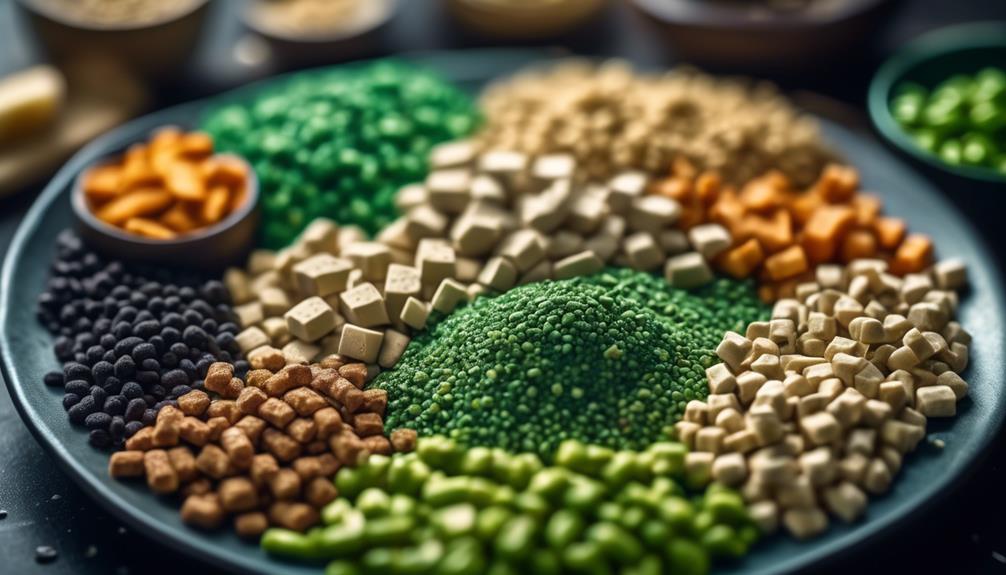Did you know that plant-based diets have been steadily gaining popularity in recent years, with a 2019 survey showing that around 9.7 million Americans follow a plant-based lifestyle?
If you're one of the many people considering a plant-based keto diet, you might be wondering which plant-based proteins are the best choices to meet your nutritional needs.
Well, look no further, because in this discussion, we will explore the top plant-based proteins that are not only delicious and versatile but also perfectly suited for a keto diet.
So, get ready to discover some exciting options that will keep you satisfied and on track with your health goals.
Tofu

Tofu is a versatile and nutrient-rich plant-based protein that can be an excellent addition to your keto diet. Not only is it low in carbohydrates and high in protein, but it also contains essential amino acids that are vital for muscle growth and repair. Tofu is made from soybeans and is a great source of calcium, iron, and magnesium. It has been linked to numerous health benefits, including improved heart health, reduced cholesterol levels, and better blood sugar control.
When incorporating tofu into your keto diet, there are plenty of delicious recipes to choose from. Tofu can be used as a substitute for meat in stir-fries, salads, and even desserts. One popular recipe is tofu scramble, a tasty alternative to scrambled eggs that's packed with protein and flavor. Another option is grilled tofu, which can be marinated in a variety of seasonings and paired with low-carb vegetables for a satisfying meal.
In addition to its culinary versatility, tofu offers several health benefits. It's rich in isoflavones, which are plant compounds that have been shown to reduce the risk of certain cancers, such as breast and prostate cancer. Tofu is also a good source of phytoestrogens, which may help alleviate symptoms of menopause. Furthermore, the high protein content of tofu can promote satiety and aid in weight management.
Tempeh
Tempeh, a fermented soybean product, is a nutritious and protein-packed addition to your keto diet. It's made by fermenting cooked soybeans with a mold called Rhizopus oligosporus. This fermentation process not only enhances the flavor of tempeh but also increases its nutritional value.
Tempeh is a great source of plant-based protein, providing about 15 grams of protein per 3-ounce serving. It's also low in carbohydrates, making it suitable for a keto diet.
One of the benefits of including tempeh in your keto diet is its high fiber content. Fiber is essential for maintaining a healthy digestive system and promoting regular bowel movements. Tempeh is also rich in vitamins and minerals, including manganese, copper, and phosphorus.
When it comes to preparing tempeh, there are plenty of delicious recipes to try. You can marinate it and grill it for a flavorful main dish, or crumble it and use it as a substitute for ground meat in tacos or stir-fries. You can also slice tempeh and bake it until crispy to make a tasty bacon alternative.
Incorporating tempeh into your keto diet not only adds variety to your meals but also provides a nutrient-dense and protein-rich option. So go ahead, give tempeh a try and enjoy the benefits it has to offer.
Seitan
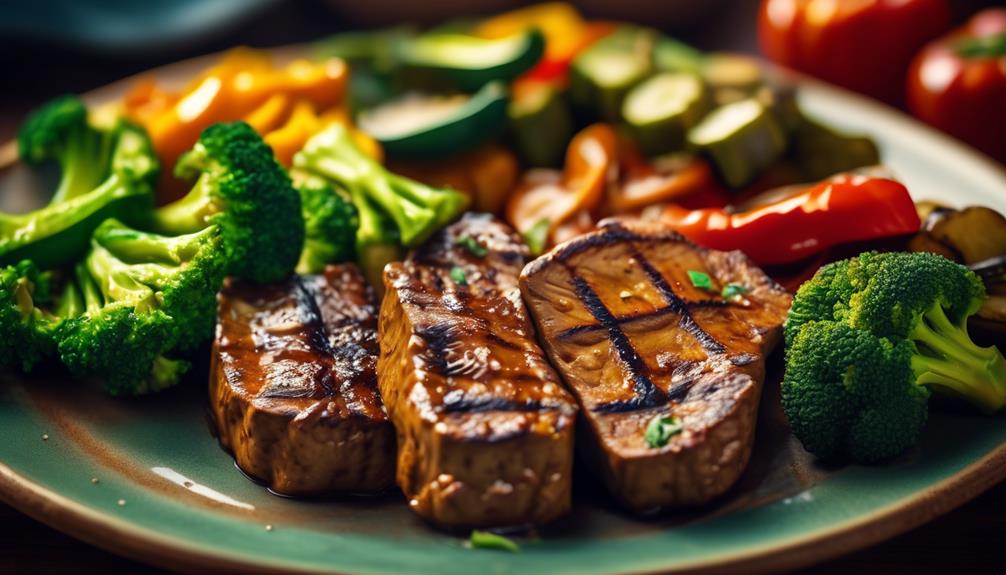
Seitan is a plant-based protein that can be a great addition to your keto diet. Not only is seitan low in carbs, but it's also packed with protein, making it an excellent choice for those following a low-carb, high-protein diet.
Additionally, seitan is a versatile meat substitute that can be used in a variety of dishes, allowing you to enjoy your favorite meals while sticking to your keto goals.
Seitan: Plant-Based Protein
With its high protein content and versatile culinary uses, seitan is a great addition to a keto diet. Seitan, also known as wheat meat or wheat gluten, is made from gluten, the protein found in wheat. It has a dense and chewy texture that makes it a popular meat substitute in many vegetarian and vegan dishes.
One of the advantages of seitan is its ability to absorb flavors, making it a versatile ingredient in various recipes. When it comes to cooking methods, seitan can be boiled, steamed, baked, or even fried to achieve different textures and flavors. It can be sliced, diced, or shredded, making it adaptable to different dishes, such as stir-fries, stews, and sandwiches.
Seitan: Low-Carb Option
To incorporate a low-carb option into your keto diet, consider seitan as a versatile and protein-packed alternative. Seitan, also known as wheat meat or wheat gluten, is made from gluten, the protein found in wheat.
Here's why seitan stands out among other plant-based proteins:
- Low in carbs: Seitan is a great choice for those following a low-carb diet. It contains minimal carbohydrates, making it suitable for keto dieters.
- High in protein: Seitan is rich in protein, providing around 25 grams of protein per 3-ounce serving. This makes it an excellent option for vegans and vegetarians who want to meet their protein needs.
- Versatile and tasty: Seitan has a chewy texture and can be flavored and seasoned to mimic the taste and texture of meat. It can be used in a variety of dishes, such as stir-fries, stews, and sandwiches.
When compared to other plant-based proteins, seitan's nutritional profile and low-carb content make it an attractive choice for those on a keto diet.
Seitan: Versatile Meat Substitute
When it comes to finding a versatile meat substitute that aligns with your low-carb keto diet, seitan emerges as a top contender due to its impressive nutritional profile and ability to mimic the taste and texture of meat.
Seitan, also known as wheat meat or wheat gluten, is made from gluten, the protein found in wheat. It's a popular choice among vegetarians and vegans because of its high protein content and low carbohydrate content.
Seitan is incredibly versatile and can be used in a variety of dishes, such as stir-fries, stews, and sandwiches. Its chewy and meaty texture makes it an ideal substitute for meat in many recipes.
Additionally, seitan is rich in essential amino acids, making it a nutritious option for those following a plant-based diet.
Edamame
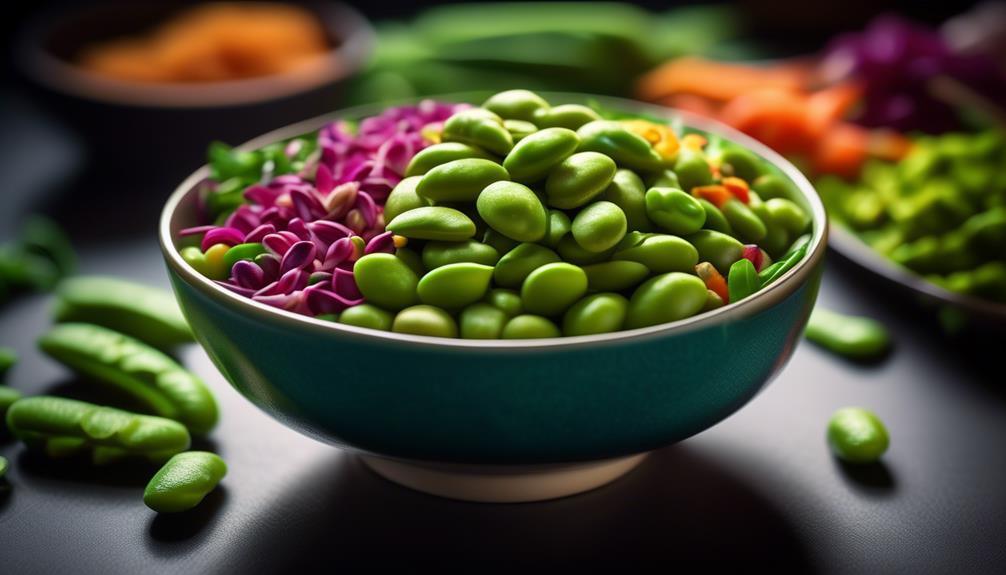
Have you ever tried incorporating edamame into your keto diet? If not, you may want to consider adding this versatile legume to your meal plan.
Edamame, which are young soybeans, make an excellent plant-based protein source that fits well within the constraints of a keto diet. Here are three reasons why you should consider including edamame in your keto meal plan:
- Low in carbohydrates: Edamame is relatively low in carbohydrates, making it a suitable option for those following a keto diet. With only 8 grams of net carbs per cup, edamame can be enjoyed without worrying about exceeding your daily carb limit.
- Rich in protein: Edamame is a protein powerhouse, packing around 17 grams of protein per cup. Protein is essential for muscle repair and growth, and it can also help keep you feeling full and satisfied.
- Nutrient-dense: In addition to being a good source of protein, edamame is also rich in essential nutrients. It contains vitamins like folate and vitamin K, as well as minerals like iron and magnesium. These nutrients play vital roles in maintaining overall health and well-being.
Incorporating edamame into your keto diet is easy. You can enjoy it steamed and seasoned as a snack, add it to salads, stir-fries, or even use it as a topping for keto-friendly bowls. Get creative and try out different edamame recipes to discover new ways to enjoy this nutritious legume while staying within your keto guidelines.
Lentils
If you're looking for another plant-based protein option to incorporate into your keto diet, lentils could be a great choice. Lentils aren't only versatile and delicious, but they also offer numerous nutritional benefits.
Lentils are a good source of protein, with about 18 grams per cooked cup. This makes them an excellent option for those following a keto diet, as they can help you meet your protein needs without consuming excessive carbs. Additionally, lentils are high in fiber, which can aid in digestion and promote feelings of fullness, making it easier to stick to your keto diet.
In terms of nutritional benefits, lentils are rich in iron, folate, and magnesium. Iron is crucial for transporting oxygen throughout the body, while folate is essential for red blood cell production and overall cell function. Magnesium, on the other hand, plays a role in energy production and muscle function.
When it comes to incorporating lentils into your keto diet, there are plenty of delicious recipes to choose from. You can make lentil soups, salads, or even use them as a substitute for ground meat in dishes like lentil meatballs or lentil tacos. Get creative and experiment with different flavors and seasonings to find your favorite lentil recipes.
Chickpeas
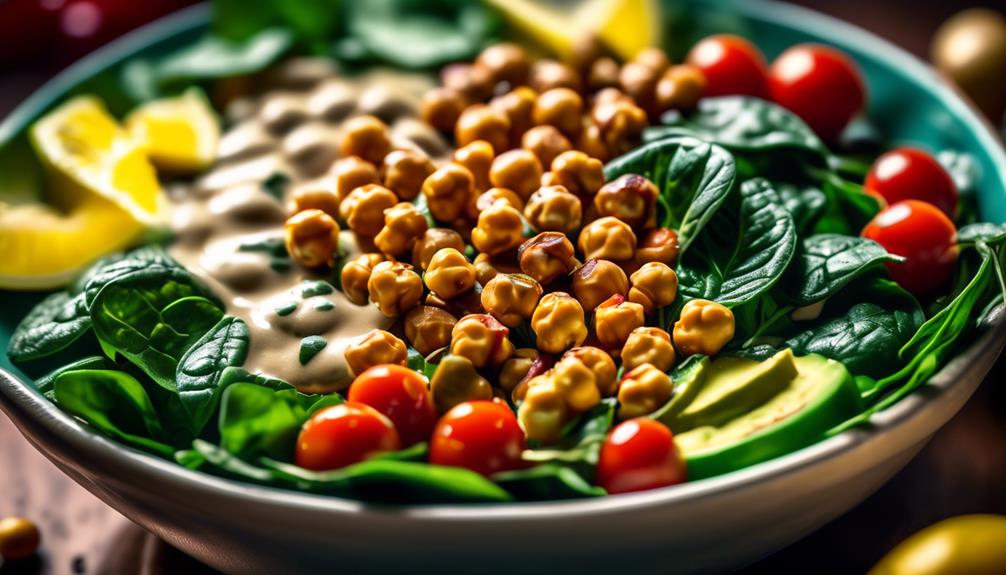
Chickpeas, also known as garbanzo beans, are a versatile and nutritious plant-based protein option that can be incorporated into a keto diet. Here are three reasons why you should consider adding chickpeas to your meals:
- Nutritional Benefits: Chickpeas are packed with essential nutrients. They're an excellent source of protein, fiber, and minerals such as iron, magnesium, and potassium. These nutrients are essential for maintaining good health and supporting bodily functions.
- Low in Net Carbs: While chickpeas are higher in carbohydrates compared to other keto-friendly foods, they're relatively low in net carbs. Net carbs are calculated by subtracting the fiber content from the total carbohydrates. Consuming chickpeas in moderation can fit within your keto macronutrient goals.
- Versatile for Recipes: Chickpeas can be used in a variety of delicious and keto-friendly recipes. You can roast them for a crunchy snack, blend them into creamy hummus, or add them to salads and stews for added texture and flavor. There are countless chickpea recipes available that can help you stay on track with your keto diet.
Incorporating chickpeas into your keto diet can provide you with a nutrient-dense and satisfying plant-based protein source. Just remember to monitor your portion sizes to ensure they fit within your daily carbohydrate limits.
Hemp Seeds
Hemp seeds are an excellent addition to your keto diet due to their nutritional benefits. They're rich in protein, containing all essential amino acids, making them a complete protein source.
Incorporating hemp seeds into your meals is easy, as they can be sprinkled on salads, added to smoothies, or used as a topping for yogurt.
Nutritional Benefits of Hemp
To fully understand the nutritional benefits of hemp, it's important to explore its composition and how it can support a healthy diet. Hemp seeds are a nutritional powerhouse, packed with essential nutrients that can be beneficial when incorporated into meals.
Here are three key nutritional benefits of hemp:
- High in protein: Hemp seeds are a great source of plant-based protein, containing all nine essential amino acids. This makes them a valuable addition to a vegan or vegetarian diet, as they can help meet protein requirements.
- Rich in healthy fats: Hemp seeds are abundant in omega-3 and omega-6 fatty acids, which are essential for brain health, reducing inflammation, and supporting cardiovascular health. Incorporating hemp seeds into your diet can help maintain a healthy balance of these essential fats.
- Excellent source of minerals: Hemp seeds are a good source of minerals such as magnesium, iron, zinc, and phosphorus. These minerals are important for various bodily functions, including bone health, energy production, and immune support.
Incorporating Hemp Into Meals
Now, let's explore how you can easily incorporate the nutritional powerhouse of hemp seeds into your meals while reaping their many benefits.
One simple way to incorporate hemp seeds into your diet is by adding them to smoothies. Simply toss a handful of hemp seeds into your favorite smoothie recipe to boost its protein content and add a nutty flavor.
You can also sprinkle hemp seeds on top of salads, yogurt, or oatmeal for an extra crunch.
If you're following a keto diet, there are plenty of hemp recipes that you can try. From hemp seed pesto to hemp-crusted chicken, these recipes offer a delicious and nutritious way to enjoy the benefits of hemp seeds while staying in ketosis.
Hemp as a Protein Source
Incorporating hemp seeds into your diet as a protein source can provide numerous health benefits. Hemp is a complete protein, meaning it contains all nine essential amino acids that our bodies need. Here are three reasons why hemp seeds are a great addition to your keto diet:
- Nutritional value of hemp: Hemp seeds are packed with essential nutrients, including fiber, healthy fats, vitamins, and minerals. They're particularly rich in omega-3 fatty acids, which have been shown to reduce inflammation and support heart health.
- Versatile cooking methods: Hemp seeds can be enjoyed in various ways. You can sprinkle them on top of salads, blend them into smoothies, or use them as a base for homemade protein bars. They can also be ground into a flour for baking or used as a substitute for breadcrumbs in savory dishes.
- Easy to incorporate: Hemp seeds have a mild, nutty flavor that pairs well with a wide range of ingredients. They can easily be incorporated into your daily meals and snacks, providing a convenient and delicious source of plant-based protein.
Chia Seeds
Chia seeds are a versatile and nutrient-dense addition to any keto diet. These tiny seeds pack a powerful punch when it comes to health benefits. Not only are they high in fiber, but they're also rich in omega-3 fatty acids, antioxidants, and minerals such as calcium and magnesium. Incorporating chia seeds into your keto diet can help improve digestion, support heart health, and promote healthy skin.
When it comes to incorporating chia seeds into your keto diet, there are plenty of delicious recipes to try. One popular option is chia pudding, which can be made by combining chia seeds with unsweetened almond milk and your choice of low-carb sweetener. You can also sprinkle chia seeds on top of salads, mix them into smoothies, or use them as a replacement for breadcrumbs in keto-friendly meatballs.
Chia seeds are also great for adding texture to your keto baked goods. You can use them as an egg replacement by mixing one tablespoon of chia seeds with three tablespoons of water and letting it sit for a few minutes until it forms a gel-like consistency.
Quinoa

Quinoa is a highly nutritious grain that can be a valuable addition to a keto diet. It's rich in protein, fiber, and essential minerals, making it an excellent plant-based protein option.
While quinoa is higher in carbohydrates compared to other keto-friendly foods, it can still be incorporated into a ketogenic meal plan in moderate amounts. There are various quinoa recipes available that can be adapted to fit a keto diet, allowing you to enjoy its nutritional benefits while staying in ketosis.
Quinoa's Nutritional Benefits
When it comes to optimizing your nutritional intake on a keto diet, understanding the benefits of incorporating quinoa is essential. Quinoa is a versatile grain that's packed with nutrients and can be a valuable addition to your keto meal plan.
Here are three reasons why quinoa is a great choice:
- High in protein: Quinoa is a complete protein source, meaning it contains all nine essential amino acids. This makes it an excellent plant-based protein option for those following a keto diet.
- Rich in fiber: Quinoa is a good source of dietary fiber, which can aid in digestion and promote feelings of fullness. This can be particularly beneficial when following a low-carb diet.
- Nutrient-dense: Quinoa is loaded with vitamins and minerals, including magnesium, iron, and zinc. These nutrients play important roles in various bodily functions and can support overall health on a keto diet.
Incorporating quinoa into your keto diet is easy. It can be cooked like rice or used as a base for salads and stir-fries. Experiment with different cooking techniques to find your favorite way to enjoy this nutritious grain.
Quinoa's Role in Ketosis
Incorporating quinoa into a keto diet can provide a valuable source of plant-based protein while supporting ketosis. While quinoa is technically a seed, it's often considered a grain due to its similar culinary uses.
Despite its carb content, quinoa can still be consumed in moderation on a ketogenic diet. One cup of cooked quinoa contains approximately 39 grams of carbohydrates, with 5 grams of dietary fiber, resulting in a net carb count of 34 grams. This moderate carb content may cause a slight increase in blood sugar levels, but it can still be compatible with ketosis for some individuals.
Furthermore, quinoa is a nutrient-dense food, providing essential nutrients such as iron, magnesium, and B-vitamins. When consumed in appropriate portions, quinoa can be a valuable addition to a keto diet, offering both plant-based protein and essential nutrients.
Quinoa Recipes for Keto
To add variety and flavor to your keto diet, try incorporating quinoa into your meal plan with these delicious and nutritious recipes.
Quinoa is a versatile grain that can be used in a variety of dishes while still maintaining a low-carb and high-protein profile. Here are three quinoa recipes for keto:
- Quinoa and vegetable stir-fry: Sauté a mix of low-carb vegetables like bell peppers, broccoli, and zucchini in olive oil. Add cooked quinoa and season with keto-friendly spices like garlic powder and paprika. This colorful and satisfying dish is packed with fiber and nutrients.
- Quinoa salad with avocado and feta: Combine cooked quinoa with diced avocado, crumbled feta cheese, cherry tomatoes, and fresh herbs like basil and parsley. Drizzle with a lemon vinaigrette made with olive oil and lemon juice. This refreshing salad is a great option for a light and filling lunch.
- Quinoa stuffed peppers: Cut bell peppers in half and remove the seeds. Fill each pepper half with a mixture of cooked quinoa, ground meat or plant-based protein, diced tomatoes, and spices. Bake until the peppers are tender and the filling is cooked through. These stuffed peppers make a satisfying and flavorful keto-friendly meal.
Incorporating quinoa into a ketogenic diet can provide a nutritious and satisfying alternative to traditional high-carb grains. Experiment with these quinoa recipes to add variety and flavors to your keto meal plan.
Spirulina
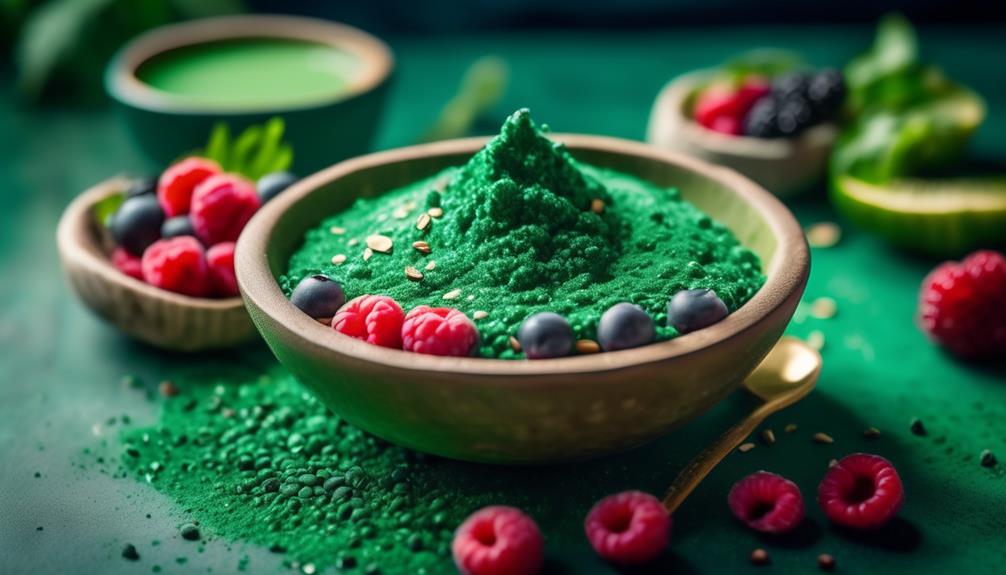
Spirulina is a nutrient-rich blue-green algae that can be a valuable addition to your plant-based protein sources on a keto diet. This superfood isn't only packed with protein but also contains essential nutrients like iron, B vitamins, and antioxidants. Incorporating spirulina into your diet can offer several health benefits.
One of the main advantages of spirulina is its high protein content. With about 60-70% protein by weight, it's an excellent option for those following a plant-based or vegan keto diet. Protein is essential for building and repairing tissues, supporting muscle growth, and maintaining a healthy metabolism.
In addition to its protein content, spirulina is also a good source of antioxidants, such as phycocyanin. Antioxidants help protect your body against oxidative stress and reduce inflammation, which are important factors in various chronic diseases.
If you're looking for creative ways to incorporate spirulina into your keto diet, consider trying spirulina smoothie recipes. You can blend it with low-carb ingredients like avocado, spinach, coconut milk, and a natural sweetener like stevia or monk fruit to create a delicious and nutritious smoothie.
Pumpkin Seeds
Pumpkin seeds are a nutritious and versatile plant-based protein source that can be easily incorporated into a keto diet. Here are three reasons why you should consider adding pumpkin seeds to your meal plan:
- Rich in nutrients: Pumpkin seeds are packed with essential nutrients that are beneficial for your health. They're a good source of protein, healthy fats, fiber, and minerals like magnesium, zinc, and iron. These nutrients support muscle growth, reduce inflammation, and promote a healthy immune system.
- Heart-healthy fats: Pumpkin seeds are a great source of monounsaturated and polyunsaturated fats, including omega-3 fatty acids. These fats can help reduce bad cholesterol levels, lower the risk of heart disease, and improve brain function.
- Versatile and delicious: Pumpkin seeds can be enjoyed in various ways. You can eat them raw as a snack, add them to salads, or use them as a topping for soups and roasted vegetables. You can also incorporate them into your keto baking by using them in bread, muffins, and granola recipes.
To reap the health benefits of pumpkin seeds, try incorporating them into your daily meals. Experiment with different pumpkin seed recipes to add a satisfying crunch and boost of nutrients to your keto diet.
Almonds
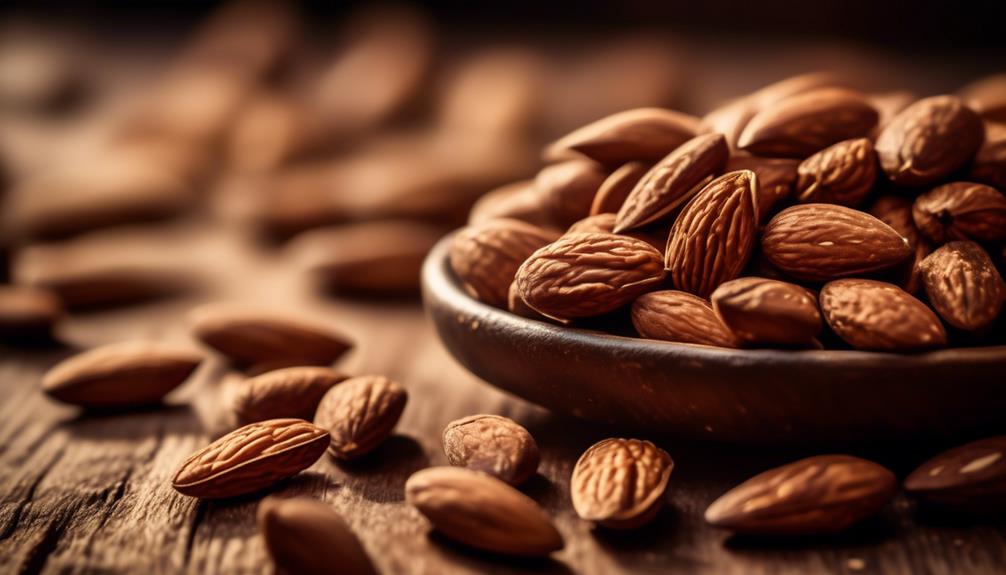
Almonds are a versatile and nutrient-rich plant-based protein option that can be easily incorporated into a keto diet. They're low in carbs and high in healthy fats, making them a perfect snack for those following the ketogenic lifestyle. Almonds are packed with protein, fiber, vitamin E, magnesium, and antioxidants, making them a nutritious choice for anyone looking to boost their protein intake on a keto diet.
When it comes to incorporating almonds into your keto diet, there are plenty of delicious options. You can enjoy them on their own as a quick and easy snack. They're portable and require no preparation, making them a convenient choice for a busy lifestyle. You can also add almonds to your keto recipes to enhance their taste and nutritional value. They can be chopped and sprinkled over salads, used as a topping for keto-friendly desserts, or ground into almond flour for baking low-carb treats.
To make a delicious keto-friendly snack, try making almond butter. Simply blend almonds in a food processor until creamy and smooth. You can enjoy almond butter on celery sticks, keto crackers, or use it as a dip for sliced vegetables. Another tasty option is making roasted almonds with your favorite seasonings. Simply toss almonds in olive oil, sprinkle with salt, and roast in the oven until golden brown.
Incorporating almonds into your keto diet is a simple and delicious way to increase your protein intake while enjoying a variety of flavors and textures. Whether you choose to snack on them as is or incorporate them into your favorite keto recipes, almonds are a keto-friendly protein option that can support your health and wellness goals.
Greek Yogurt
For those following a keto diet, Greek yogurt can be a beneficial addition to your meal plan. Here are three reasons why Greek yogurt is a keto-friendly option with numerous health benefits:
- High in Protein: Greek yogurt is packed with protein, making it an excellent choice for those looking to increase their protein intake while following a keto diet. Protein is essential for building and repairing tissues and can help keep you feeling fuller for longer. Additionally, protein can help support muscle growth and maintenance.
- Low in Carbohydrates: Greek yogurt is relatively low in carbohydrates, making it a suitable option for those following a keto diet, which requires limiting carb intake. By choosing Greek yogurt instead of regular yogurt, you can enjoy the creamy and tangy taste while keeping your carb count in check.
- Alternative to Dairy: If you're following a keto diet but have trouble digesting dairy products, Greek yogurt can be a great alternative. Greek yogurt is strained, removing much of the lactose, which is the sugar found in milk. This makes it easier to digest for individuals with lactose intolerance or sensitivity.
To incorporate Greek yogurt into your keto diet, you can enjoy it as a snack on its own, mix it with nuts and seeds for added crunch, or use it as a base for smoothies and dressings. Just make sure to choose plain Greek yogurt without added sugars or flavors to keep it keto-friendly.
Conclusion
So there you have it, folks! While the keto diet may be known for its emphasis on high-fat animal products, don't forget about the irony of plant-based proteins.
Yes, you heard it right. Tofu, tempeh, seitan, and other plant-based options can provide you with the protein you need while keeping you in ketosis.
So, next time you're planning your keto meals, don't overlook these sneaky sources of protein. Your body and the environment will thank you!

